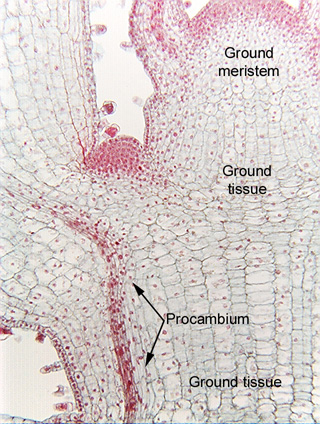Up
Apical meristem
Basal meristem
Basal meristem
Intercalary meristem
Axillary meristem
Axillary meristem
Meristemoid
Procambium
Protoderm, promeristem
Apical cell, fern
Apical cell, Equisetum
Mantle-Core
Tunica-Corpus
CMC zone
Corpus zonation
Cocklebur apex
Large apex, cactus
Large CMC. PRM
Large PZ
Files of cells
Axillary bud, Coleus
Axillary bud, ash
Fern root tip
Fern root, mag
Cattail root tip
Cattail apex, mag
Cattail root cap
Root protoderm
Symplastic growth
Corn root
Corn root, mag
| |
 Fig. 6.2-1.
Longitudinal section of a shoot tip of coleus (Coleus). Based on
position, there are two types of meristem in this micrograph: a shoot apical
meristem and an axillary meristem. However, meristems are also classified
according to the types of tissues they produce. Look at the band of reddish
cells that runs up and turns to the left just below the axillary meristem. The
band consists of the long, narrow cells of a meristem called a procambium, and
as they continue to divide, some of their progeny cells will develop into
vascular tissues -- xylem and phloem. Fig. 6.2-1.
Longitudinal section of a shoot tip of coleus (Coleus). Based on
position, there are two types of meristem in this micrograph: a shoot apical
meristem and an axillary meristem. However, meristems are also classified
according to the types of tissues they produce. Look at the band of reddish
cells that runs up and turns to the left just below the axillary meristem. The
band consists of the long, narrow cells of a meristem called a procambium, and
as they continue to divide, some of their progeny cells will develop into
vascular tissues -- xylem and phloem.
Most
of the right side of the micrograph consists of just uniform parenchyma produced
by cell divisions that occur below the shoot apical meristem: that region is
called a ground meristem because it produces a ground tissue, a tissue that is
relatively extensive and uniform.
|
 Fig. 6.2-1.
Longitudinal section of a shoot tip of coleus (Coleus). Based on
position, there are two types of meristem in this micrograph: a shoot apical
meristem and an axillary meristem. However, meristems are also classified
according to the types of tissues they produce. Look at the band of reddish
cells that runs up and turns to the left just below the axillary meristem. The
band consists of the long, narrow cells of a meristem called a procambium, and
as they continue to divide, some of their progeny cells will develop into
vascular tissues -- xylem and phloem.
Fig. 6.2-1.
Longitudinal section of a shoot tip of coleus (Coleus). Based on
position, there are two types of meristem in this micrograph: a shoot apical
meristem and an axillary meristem. However, meristems are also classified
according to the types of tissues they produce. Look at the band of reddish
cells that runs up and turns to the left just below the axillary meristem. The
band consists of the long, narrow cells of a meristem called a procambium, and
as they continue to divide, some of their progeny cells will develop into
vascular tissues -- xylem and phloem.